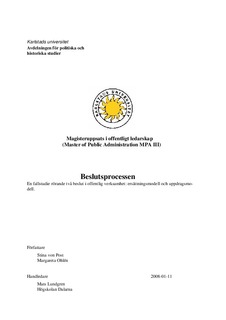Beslutsprocessen : En fallstudie rörande två beslut i offentlig verksamhet: ersättningsmodell och uppdragsmodell.
Abstract
Svensk : Syftet med uppsatsen har varit att beskriva och analysera hur ärenden bereds och beslutas inom två landstingsorganisationer. Fyra forskningsfrågor har vi ställt oss: 1) aktualisering av ett ärende för att bli föremål för ett formellt beslut, 2) den formella och informella beredningen av ett aktualiserat ärende, 3) faktorer som påverkar det slutgiltiga beslutets kvalitet och innehåll, 4) formella krav på ärendeberedningen.
En kvalitativ fallstudie av två händelsekedjor har genomförts där teorier kring beslutsprocessen har studerats för att ta reda på vilka faktorer som är av central betydelse i beslutsprocessen. Genom att jämföra hur beredningen inför beslut går till i empirin med teorier om beslutsprocessen har analys av två beslut genomförts - ersättningsmodell och uppdragsmodell.
Avgränsningen var att studera beslutsprocessen på förvaltningsnivå från uppdrag till beslut. Slutsatser är att det finns olika sätt som ärenden aktualiseras inom offentlig verksamhet, vilket visar på att makten över dagordningen kan ses som delad mellan politikerna och tjänstemannaledningen. I de fall politikerna har en uttalad vilja att driva ärenden har de också makt att göra det. Samtidigt har tjänstemännen också möjlighet att utöva makt över dagordningen genom att driva ärenden de fångat upp i organisationen. De kan med sin expertkunskap påverka politikerna så att de får upp strategiska frågor på dagordningen. Tre områden har identifierats som påverkar beslutsprocessens kvalitet och innehåll dessa är brister i syfte och mål, tidsplanering och avsaknad av användbara kvalitetsanalyser. English : The purpose of the essay has been to describe and to analyze how errands are prepared
and decided within two county council organizations. We have four research
questions: 1) arising of a dossier in order to become object for a formal decision,
2) the formal and informal preparation of an updated dossier, 3) factors
that has influence on the quality and content of the final decision, 4) formal requirements
on the dossier preparation.
A qualitative case study of two event chains has been implemented where theories
around the decision-making process has been studied in order to find out on
which factors that are of central importance in the decision-making process.
Through comparing how the preparation, before decisions are made in the empiricism
with theories about the decision-making process, analysis of two decisions
has been made - compensation model and commission model. The demarcation
was to study decision-making processes on administrative level from commissions
to decisions.
Conclusions are that there are various ways that dossiers are updated within public
activity, this shows that the power over the agenda can be seen as divided between
politicians and the official management. In those cases were the politicians
has a pronounced will to run dossiers, they also have the power to do it. At the
same time, the officials also have possibility to conduct power over the agenda by
running dossiers they have caught up in the organization. With their competence
or expert knowledge they can influence the politicians so that they take strategic
questions up on the agenda.
Three areas have been identified that influences the quality and content of the decision-
making process, these are lack of aim, purpose, time and applicable quality
analyses.
Description
Masteroppgaven ble presentert 24 januar 2008
